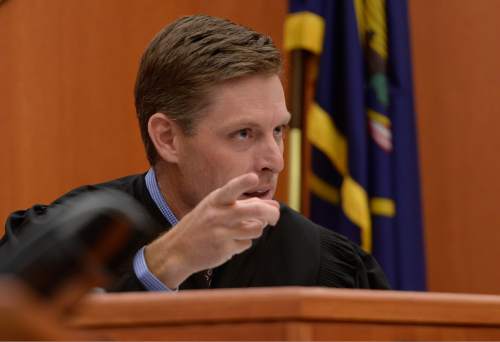This is an archived article that was published on sltrib.com in 2015, and information in the article may be outdated. It is provided only for personal research purposes and may not be reprinted.
West Jordan Mayor Kim Rolfe went to court Tuesday to block a planned City Council vote to slash his salary by 90 percent and make his a part-time position.
But 3rd District Judge Ryan Harris quickly disposed of the request for a temporary restraining order. He said it was "inappropriate for courts to step in and short-circuit the political process," and he denied the order.
Rolfe, who became the city's first full-time mayor when he took office in 2014, filed the emergency motion in an attempt to head off the pay-cut vote at a Tuesday night council meeting. But the issue was pulled off the agenda at the last minute by Councilman Ben Southworth, who had sponsored the proposal to chop Rolfe's annual salary from $89,500 to about $9,000.
Southworth said the salary reduction had become a distraction from the real issue of trying to get the mayor to quit "meddling" in executive matters of the city.
Under West Jordan's form of government, the day-to-day affairs of the city, including hiring and firing, are the responsibility of the city manager.
"We have an elected official in city hall with no executive authority trying to act like he has executive authority, and it's very problematic," Southworth said.
The effort by a mayor to use a court order to stop his city council from taking action against him is rare in Utah, if not unprecedented.
Tyler Ayres, Rolfe's attorney, acknowledged the tactic is unusual, but said it seemed appropriate in the current matter because of the imminent threat of action that would harm the mayor financially and hamstring his ability to perform his duties.
"We decided to utilize our system of checks and balances and that includes the third branch of government" — the judiciary, Ayers said.
Ayres said Rolfe recognizes the authority of the council to set the mayor's salary — but not the way it has gone about it. That included calling a rush meeting of the council with little public discussion or input on the matter and no consideration of the hardship the change would impose on the mayor, who left his job as a developer to devote his full attention to the elected position, Ayres said.
The request for a restraining order said the council's proposal to cut Rolfe's salary to one-tenth of the rate set before he took office was "unconscionable" and possibly motivated by "spite."
As evidence, the motion cited a Salt Lake Tribune article from April quoting Southworth accusing Rolfe of "abuse of power" in a previous dispute over the suspension of the city attorney, Jeff Robinson, who has since resigned. Southworth ran against Rolfe in the last mayoral election, the complaint noted.
Southworth on Tuesday denied any ulterior motive, saying the allegation was a "smokescreen" designed to take attention away from the mayor's actions and the latest tactic of running to court to try to thwart the will of the council.
"It seems pretty clear to me that when you're trying to stop public deliberation on a matter, which is what Mayor Rolfe is doing, that's an assault on the public process and it's something we hold dear in this country. I find that unbecoming of the trust of elected office and, quite frankly, I find it very perplexing," Southworth said.
Judge Harris, using more measured language, seemed to agree from early on in the 30-minute hearing Tuesday afternoon.
He sharply questioned Ayers about the existence of any law to support the notion that the council was acting illegally, and when the attorney could not point to one, the judge said the complaint "doesn't seem like it's got legal legs."
Harris said a dispute between a mayor and city council is "typically and best handled by the political process itself.… I need to steer clear of that."



